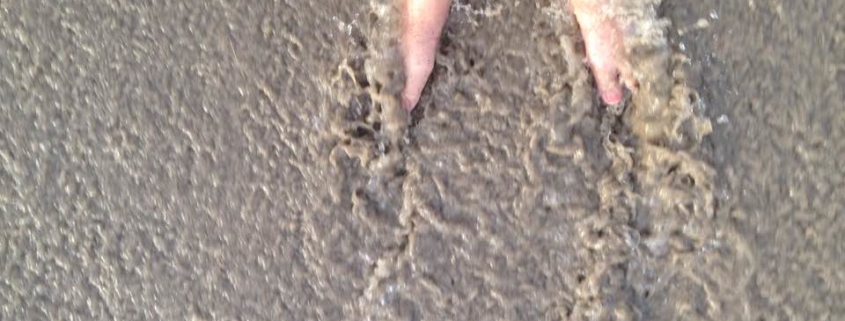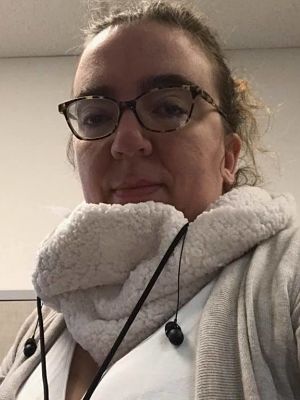The Over Under
I’ve always loved the ocean. When I was a child my family visited friends on the Jersey shore in the summers. We spent most of that time on a small stretch of beach a few blocks from the summer home the friends all shared. The adults would set up their beach chairs for the day, get out their books, suntan lotion, snacks, and knitting for the duration. We were a swarm of kids of all ages, cooperatively looked after. The older kids all had surfboards and would be deep in the water as quickly as possible. Those of us who were younger stayed closer to the shore, playing in the shallow surf until we were old enough to go all the way in the water.
A man I thought of as Uncle Johnny taught me to swim in the waves; he was well over six feet tall, broad shouldered, and strong. All the younger kids would go in the water and stand near him while he gave us his tips for ocean swimming: “Now. When a wave comes, you gotta make a decision, right? You gotta decide whether you are gonna go over or under. You gotta decide.”
I can still hear him in my mind, with his thick Jersey accent, “You look at whether it’s going to crash, and you gotta decide whether it’s going to crash on your head. You don’t want that. Go over if it hasn’t crashed yet”.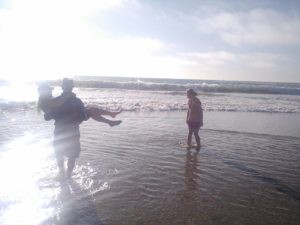
Then a wave would come, and he’d make us tell him what we were going to do: “Over or under, you gotta tell me what you are gonna do!”
We’d scream our answers, squealing and giggling in excitement. With each wave at least one of us would get crushed; sometimes they were stronger than we realized they would be. Scary as that is when you are six, we knew we were never in danger. Johnny was big enough that he could reach down and pick us up by the back of our swimsuit with one hand. Often he’d emerge from a wave holding two kids, one in each hand, both spitting out salt water and wiping it from their eyes, with Johnny saying, “It’s alright. It’s okay. Time to get your feet back under ya”.
It didn’t take long to get the hang of it, and every time my little six-year-old body jumped over a wave or dove under it and came back up intact and exhilarated, I felt like I could do all of the things in the world. There was no uncertainty. The waves would come and go, and I’d look at Johnny as they passed by, encouraged by his big smile.
Decades later, I visit and go in the ocean as often as I can. Things are different now. I’m an adult. I have a responsible, white-collar job where people count on me. As life happens, I’ve drifted away from Johnny and his family, who are rooted on the east coast while I’m on the west. My kid is not speaking to me in the midst of a belated teenage rebellion that has been almost overwhelmingly painful. I have freelance assignments that are constantly late. I’m supposed to be managing a friend’s political campaign and I’m never helping him enough. I’m in an MFA program in creative writing and have increasing amounts of reading and writing and thinking to do all the time. My stepfather’s dying.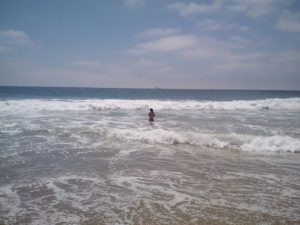
I was an adult when my my mom married my stepfather. He’s always been my editor and someone with whom I talk books or the most recent podcast from Malcolm Gladwell. My stepfather reads long novels. The dissertation for his PhD was on Pynchon’s Gravity’s Rainbow. He immerses himself in the kinds of literary challenges I’ve always stubbornly avoided. I’ve never read Moby Dick, Anna Karenina, or Infinite Jest. For decades I’ve been a writer who reads and writes in 700-1000 word chunks. These are easy word counts for me to reach. I explain aspects of homelessness or profile the newest restaurant in simple terms. Sometimes I make my co-workers cry when I write their retirement announcements. But I’ve been coasting for far too long. I wonder if diving into Pynchon or Dostoevsky is like diving into the ocean and letting the story be bigger than you are—at least for a little while.
I came into this MFA program to write a long story. It’s the first long story I’ve ever tried to write, about raising someone else’s child. This child—my child—is no longer so young. I was her north star for three years of middle school, four years of high school, and the big move into her college dorm room. She’s always been troubled and she needed me to achieve what others told her she couldn’t have: a high school diploma, a chance to go to college, and a life that was better than her parents’. Now an adult, child therapists tell me she is doing what she has to in order to become independent from me. My daughter lashes out, causing her to become estranged from me and from my stepfather, whom she was closer to than almost anyone. He was someone she could talk to. He sat with her for countless hours helping her with writing homework when her writing skills were something that made her feel the most vulnerable. Now that his health is in pretty serious peril, she’s writing him emails, trying to find her way back to the family.
In the modern age, dying doesn’t mean the same thing it used to. He’s lived a long time with chronic heart trouble, long enough to see new treatments emerge regularly. There are procedures, stents, and devices about which the doctors have no statistical evidence—but think could help. He could live for another year or ten. He could outlive me. My kid could never speak to me again or come back tomorrow with everything she needs to make amends.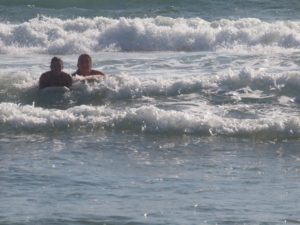
This summer I spent some time swimming in the ocean over my birthday weekend, letting the waves throw me around over and over, the current strong enough that my friend Carrie and I had to walk a good distance back to our towels when we finally got out. I could hear Johnny’s voice in my head as I waded into the surf, getting closer to the point where the waves are going to be over my head, diving under the first one in order to get used to the water and become part of the current. You can’t be your autonomous self in the midst of constant waves; you have to become a part of the tide, letting the ocean move you around as the waves pass by. You are not bigger than the water. Stronger swimmers than I am have been overcome.
I’m no stranger to uncertainty, but it’s funny how you attach yourself to the familiar whenever it is present. For example, this essay is just over 1000 words long.
Emma Margraf is a freelance writer, devoted home cook, and former foster parent working toward her MFA in Creative Nonfiction at Antioch University.

